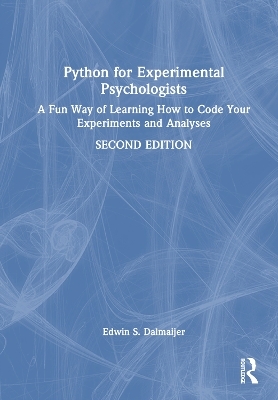
Python for Experimental Psychologists
A Fun Way of Learning How to Code Your Experiments and Analyses
Seiten
2024
|
2nd edition
Routledge (Verlag)
978-1-032-00480-8 (ISBN)
Routledge (Verlag)
978-1-032-00480-8 (ISBN)
- Lieferbar (Termin unbekannt)
- Versandkostenfrei innerhalb Deutschlands
- Auch auf Rechnung
- Verfügbarkeit in der Filiale vor Ort prüfen
- Artikel merken
Python for Experimental Psychologists equips researchers who have no prior programming experience with the essential knowledge to independently script experiments and analyses in the programming language Python. It offers an excellent introduction, whether you are an undergraduate, a PhD candidate or an established researcher.
Python for Experimental Psychologists equips researchers who have no prior programming experience with the essential knowledge to independently script experiments and analyses in the programming language Python. This book offers an excellent introduction, whether you are an undergraduate, a PhD candidate, or an established researcher.
This updated edition is on Python 3 (the most current version). It starts by teaching the fundamentals of programming in Python and then offers several chapters on scripting experiments (displaying stimuli, obtaining and logging user input, precision timing, etc.) using the popular PsychoPy package. The remainder of the book is dedicated to data analysis and includes chapters on reading/writing to text files, time series, eye tracking, data visualisation, and statistics.
Access to a companion website enriches the learning experience with colour figures, example stimuli, datasets, scripts, and a portable Windows installation of Python. This book assumes no prior knowledge, and its informal and accessible tone helps readers with backgrounds in experimental psychology and cognitive neuroscience to quickly understand Python. It serves as a useful resource not only for researchers in these fields but also for lecturers instructing on methodology and data analysis.
Python for Experimental Psychologists demystifies programming complexities and empowers researchers to proficiently conduct experiments and analyse their results.
Python for Experimental Psychologists equips researchers who have no prior programming experience with the essential knowledge to independently script experiments and analyses in the programming language Python. This book offers an excellent introduction, whether you are an undergraduate, a PhD candidate, or an established researcher.
This updated edition is on Python 3 (the most current version). It starts by teaching the fundamentals of programming in Python and then offers several chapters on scripting experiments (displaying stimuli, obtaining and logging user input, precision timing, etc.) using the popular PsychoPy package. The remainder of the book is dedicated to data analysis and includes chapters on reading/writing to text files, time series, eye tracking, data visualisation, and statistics.
Access to a companion website enriches the learning experience with colour figures, example stimuli, datasets, scripts, and a portable Windows installation of Python. This book assumes no prior knowledge, and its informal and accessible tone helps readers with backgrounds in experimental psychology and cognitive neuroscience to quickly understand Python. It serves as a useful resource not only for researchers in these fields but also for lecturers instructing on methodology and data analysis.
Python for Experimental Psychologists demystifies programming complexities and empowers researchers to proficiently conduct experiments and analyse their results.
Dr Edwin S. Dalmaijer is a Lecturer (Assistant Professor) at the University of Bristol. He holds a DPhil from the University of Oxford, was a postdoc at the University of Cambridge, and has authored Python libraries, standalone software packages, teaching materials, and research articles.
About this book
About Python
About the authors
1. Python
2. Variable Types
Make Some Noise
Random Numbers
3. Creating and Presenting Stimuli
4. Processing Responses
Make Some Noise
5. Scripting An Experiment
Make Some Noise
6. Analysing Behavioural Data
7. Analysing Traces
8. Eye Tracking
9. Common Statistical Tests
Getting Help
Acknowledgements
References
| Erscheinungsdatum | 15.10.2024 |
|---|---|
| Zusatzinfo | 8 Line drawings, black and white; 12 Halftones, black and white; 20 Illustrations, black and white |
| Verlagsort | London |
| Sprache | englisch |
| Maße | 174 x 246 mm |
| Themenwelt | Geisteswissenschaften ► Psychologie ► Allgemeine Psychologie |
| Geisteswissenschaften ► Psychologie ► Test in der Psychologie | |
| Geisteswissenschaften ► Psychologie ► Verhaltenstherapie | |
| Mathematik / Informatik ► Informatik ► Programmiersprachen / -werkzeuge | |
| Naturwissenschaften ► Biologie ► Humanbiologie | |
| Naturwissenschaften ► Biologie ► Zoologie | |
| ISBN-10 | 1-032-00480-0 / 1032004800 |
| ISBN-13 | 978-1-032-00480-8 / 9781032004808 |
| Zustand | Neuware |
| Haben Sie eine Frage zum Produkt? |
Mehr entdecken
aus dem Bereich
aus dem Bereich
Techniken der Verhaltenstherapie
Buch (2024)
Julius Beltz GmbH & Co. KG (Verlag)
35,00 €


